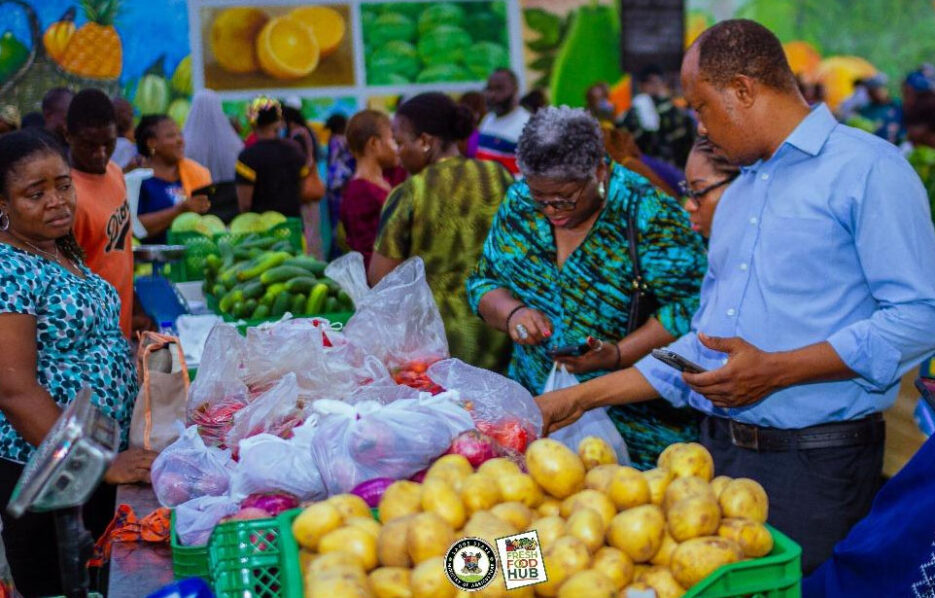
Inflation rate in Nigeria increased to 31.70 per cent in February from 29.90 per cent in January of 2024 according to the National Bureau of Statistics (NBS). Inflation rate is expected to be 34 per cent by the end of this quarter, according to Trading Economics global macro models and analysts expectations. Food inflation is even higher estimated at 35.4 per cent in January. Of note is that many now find it difficult to take three square meals daily owing to the harsh economy induced by the devaluation of the naira and the discontinuation of the fuel subsidy, which has led to high inflation and galloping prices of commodities including food. As a result, some Nigerians do not bother about the quality and healthiness of the food they eat; they just want their stomach filled. This, experts have argued will negatively impact, nutrition wise. GBENGA SALAU examines how the high cost of food in Nigeria may compound Nigeria’s malnutrition crisis.
Tope Ogundipe is a teacher in a private school in Lagos, but earns N30,000 monthly. As part of cutting cost before now, she shares a room apartment with two of her colleagues to share bills, but since the removal of fuel subsidy and devaluation of naira, it has even become more tough meeting her daily needs including taking her one square meal. Now, whenever Ogundipe takes garri (cassava flakes), which is a constant meal for her, it is without sugar and groundnut. She is forced to follow that route as part of cost cutting measures, especially as food inflation is estimated at 35.4 per cent higher than the national inflation rate put at 31.7 per cent.
Commenting on how high food inflation and high prices of food items negatively affect purchasing power, including buying and eating healthy food, a clinical nutritionist, Funmilola Ijiwola, stated that with the increase in price of items especially food stuffs, it is like pouring salt on injury because compromises will have to be made and the compromises might have implication on the nutrient intake of an individual or a family.
“Although everyone will be conscious of not getting ill at this time, but because of the high cost of drugs and hospital services, their choices of goods is limited owing to the high price of food stuffs,” Ijiwola stated.
Also speaking, the Programme Manager, Nigeria Health Watch, Adanna Opara, said persistent rise in prices of food and other commodities had significantly affected the purchasing power of Nigerians.
Opara said rising food prices not only affects the quantity of food that people and families can afford, but also the quality as people can no longer afford nutritious foods such as fruits, vegetables, lean protein and whole grains.
“They instead begin to opt for cheaper, calorie-dense, and less nutritious, unhealthy food options such as highly processed foods. This negative affects their nutritional status and overall health, which leads to higher prevalence of diet-related non communicable diseases such as obesity, type-2 diabetes, Hypertension, cardiovascular diseases amongst others.
“With rising food prices leading to higher rates of malnutrition, micronutrient deficiencies, and diet-related non communicable diseases, healthcare costs also rises and this places a strain on our already stretched health systems,” Opara stated.
That the limited options and access to quality and healthy food has implications was buttressed by the Statistician-General of The Federation/CEO National Bureau Of Statistics, Adeyemi Adeniran, who captured it recently during the launch of a new indicator, the ‘Cost of a Healthy Diet’.
He said: “While healthy diets are crucial for preventing various forms of malnutrition and reducing the risks of non-communicable diseases, the escalating cost of nutritious foods has emerged as a significant obstacle for individuals and communities globally.”
And there are fears that many like Ogundipe may join the growing list of Nigerians suffering from one form of malnutrition, thereby, further increasing the rate of malnutrition in the country.
This is more so that the cost of a healthy diet is rising monthly.
According to the National Bureau of Statistics, the national average cost of a healthy diet in October 2023 was N703 but got increased to N786 by December 2023.
The NBS further said in recent months, the cost of healthy diet has risen faster than general inflation and food inflation.
With this, experts have argued that the malnutrition figures in the country may be compounded.
This is more so that the statistics around malnutrition in the country are not cheering. According to the United Nations International Children Emergency Fund (UNICEF), every hour, 100 children under five years die of malnutrition in Nigeria, which means about 2,400 children are lost to malnutrition daily.
UNICEF further stated that as of last year, 35 million children under five years of age suffer from malnourishment. Of which 12 million children had stunted growth, three million wasting from excessive and rapid weight loss, and 23.5 million anaemic.
It noted that when the incidence of malnutrition is compared between adults and children, its impact on children brings worse results, stating that about seven per cent of children under five years in Nigeria experience wasting, above the global average 4.6 per cent
It added that 31.5 per cent of children experience stunting, which is also above the global average of 19.9 per cent.
UNICEF further stated that the worst of all is the fatal consequences of malnutrition in Nigeria, saying that Nigeria’s child mortality rate is 11.7 per cent above the global average of 3.7 per cent, which was why the global hunger index ranked Nigeria 109th position out of the 125th countries after scoring 28.3 per cent in 2023.
Similarly, the Global Nutrition Report on Nigeria disclosed that the country has shown limited progress towards achieving the diet-related non-communicable disease (NCD) targets, stating that 15.7 per cent of adult (aged 18 years and over) women and 5.9 per cent of adult men are living with obesity.
The reported further said that Nigeria’s obesity prevalence is lower than the regional average of 20.8 per cent for women and 9.2 per cent for men.
“At the same time, diabetes is estimated to affect 6.8 per cent of adult women and 7.5 per cent of adult men,” the global Nutrition Report on Nigeria said.
Also, in 2024, Nigeria is expected to see about 26.5 million people grappling with high levels of food insecurity, as disclosed by the Federal Government and its partners during the unveiling of the October 2023 Cadre Harmonisé analysis on food insecurity.
Professor Tanimola Akande, a public health specialist, said the sky-high prices of food items may compound Nigeria’s malnutrition crisis.
“Nutritious food is important for good health. Food is a basic need of man. Unfortunately, many Nigerians are unable to afford good food or a balanced diet. The poverty rate in the country is on the increase, and at the same time, the food inflation rate is very high.
“Owing to inadequate intake of food, malnutrition, particularly among the vulnerable group (children), is on the increase. Severe acute malnutrition is on the increase in health facilities. Protein energy malnutrition is so common in the communities. Some families even go hungry for days.
“This situation makes them sick, fragile, anaemic (low blood level), and easily susceptible to infectious diseases. This eventually leads to loss of lives,” he said.
Ijiwola, a clinical nutritionist, also agreed with Akande, saying the stunting rate in Nigeria is high, the increase in the prices of foodstuffs can further aggravate the situation, increasing the rate of underweight and wasting situation.
She said: “The quality, quantity and frequency are of meal intake will be greatly affected. Individual will be on the lookout for cheap food thereby not conscious of the state of the food bought which can be expired or poorly stored or compromised.”
According to her, individuals, food processors, marketers and other operation within the food value chain might start cutting corners to reduce the cost of production.
On her part, Adanna noted that with limited access to nutritious food, there is the likelihood of higher rates of stunting in children, which happens as a result of chronic or longstanding malnutrition and usually associated with poverty, poor maternal health and nutrition, frequent illness and inappropriate care, and feeding in early life, which can be exacerbated by rising food prices and low purchasing power.
“It can lead to micronutrient deficiencies, especially among vulnerable groups (children under five and women), lack of dietary diversity as the diet of the household members become unbalanced, protein deficiency leading to poor growth, impaired tissue repair and immune function. These exacerbate malnutrition and lead to poor health outcomes.
“Insufficient access to food or good quality food brought about by rising food prices and reduced purchasing power can also lead to wasting in children under five and eventually severe acute malnutrition.
“The health and nutritional status of new mothers are also adversely affected by the rising cost of food and the reduction in purchasing power. If this situation is left to continue for long periods of time, the mother becomes severely malnourished, and this would ultimately affect lactation, reducing her milk supply.
“Some mothers at this point stop exclusively breastfeeding their less than six-month old babies. Hence, malnutrition in lactating mothers eventually leads to malnutrition in their babies and its associated consequences.
“With rising food prices and reduced purchasing power, households can no longer afford to buy a diverse range of highly nutritious foods, thus, leading to micronutrient deficiencies,” Opara stated.
With high food inflation and limited access and consumption of balanced and healthy food, what many Nigerians take as normal are now luxury.
A survey of open market prices for instance revealed that a big bottle of roasted groundnut that used to be sold for less than a N1,000 is now between N1800 and N2000. Also, a bowl of beans that use to be sold for N400 is now being sold for N1,100.
Before now, there used to be N100 tomato and pepper in the open market but the minimum offered for sale is N200.
A sachet of Spaghetti of N300 is now sold for N800 and above.
Speaking on the implication of increased malnutrition figures for public health in the country, Akande noted that it could lead to increased morbidity and mortality rates, particularly, among children.
“This will further worsen our health indices like infant and under-five mortality rates. This is rather unfortunate. Nigeria made some little improvement in these indices recently, but the current challenge of malnutrition can possibly reverse the gains made.”
Weighing in also, the Executive Director Civil Society Legislative Advocacy Centre (CISLAC), Auwal Musa Rafsanjani, stated public health is a priority for responsible governance and must be given the necessary support by governments at all levels for national development.
He added that malnutrition is a serious challenge in Nigeria, with increased risk of not only child mortality but high risk of mortality by even the elderly, especially in the current economic crisis, as citizens are finding it difficult to meet their daily needs for food.
“Bad government policies coupled with ineffectiveness in governance and lack of adequate policy frameworks that will address the socio -economic issues and agricultural productivity in the country contributes significantly to the current plight of increased hunger and poverty in the country, which by extension compound the seriousness of the malnutrition issue we are already battling in the country.

“High rate of malnutrition pose a great threat to public health and development challenges in every country. Malnutrition is one of the major challenges that have direct consequences on children’s cognitive development, which results in lowered performance in education and low productivity invariably contributing to economic losses by the country.
“This shows that there is a direct relationship between proper and good nutrition and cognitive development and also productivity in economic terms, which is why it becomes necessary for governments at all levels to make public health especially aspects of nutrition a priority because we are dealing with an issue of productivity in terms of human capital and without adequate nutrition people cannot be able to do survive,” the CISLAC boss stated.
To help cushion the effect of the harsh economy on the citizens, government at all levels are dishing out palliatives. However, most of the food palliatives being given to citizens are grains and high in carbohydrate foods.
Opara said while grains and carbohydrate-rich foods are good sources of energy, they are often deficient in other essential nutrients such as vitamins, minerals and protein.
“While political leaders may mean well by distributing grains and carbohydrate-rich foods as palliative to provide immediate relief to households experiencing food insecurity, this initiative can compound the country’s malnutrition crises in the long run,” Opara noted.
For Ijiwola, palliatives can be of help, but it is important that the government gets the nutrition knowledge on the type of palliatives that should be given out.
She added that food palliatives to support citizens should be done with the mindset of meeting the nutrient needs of the average beneficiaries. “When you give grains, you need to think of what to balance it with.
“The grains being given are good for individuals or family that will be able to afford protein source foods like meat, fish, chicken or eggs
“In the case of individuals that cannot afford the protein source to complement the food palliatives, it means the individual or family will only get to feed on the grains which are majorly carbohydrates contain foods. The situation will cause an imbalance in nutrient intake and thereby increases the rate of malnutrition in the country,” she stated.
To better implement the dishing out of food palliatives by government to meet nutritional needs of the average citizens, Opara suggested that government should ensure that the palliative packages contain a variety of foods from all the food groups; carbohydrates, proteins, vitamins, minerals, and healthy fats.
She also said that fortified foods with various micronutrients are part of the palliative package.
“Focusing on long-term initiatives such as providing nutrition education to household members and community leaders to encourage the consumption of a diverse range of nutrient-rich foods as well as dietary diversification,” she stated.
With limited resources, since governments as well as many private sectors have not increased salary, how can people take healthy and balanced diets amid high food inflation, Akande said it would be difficult to take health and balanced diets with low income.
On her part, Ijiwola believes Nigerians can take healthy and adequate diet amid high food inflation by learning the basics of nutrition and adequate diet, which could be got from a nutritionist, dietician or credible nutrition sites.
Also commenting, Opara said ways in which the citizens can ensure that they eat healthy diets amid food inflation include eating foods, fruits and vegetables, in season when they are most affordable
She also suggested growing a home garden to reduce food expenses and selling the excess to extra income to buy more food.
She advocated eliminating processed and packaged foods from diets but instead going for more nutrient densed options such as fruits, vegetables, lean proteins sources, beans, lentils, eggs, and whole grains.
“Prioritise healthy food options and avoid buying unnecessary items that would put a strain on the budget meant for food.”






